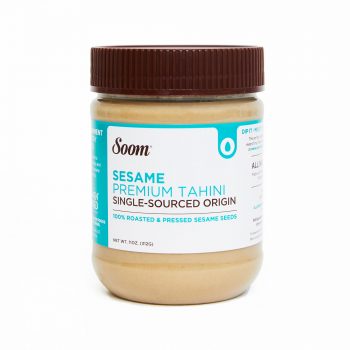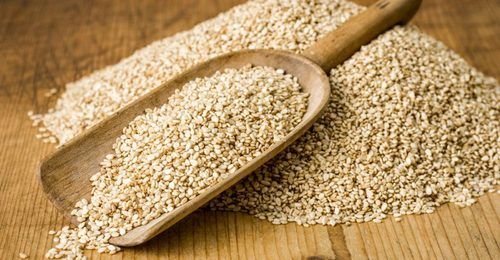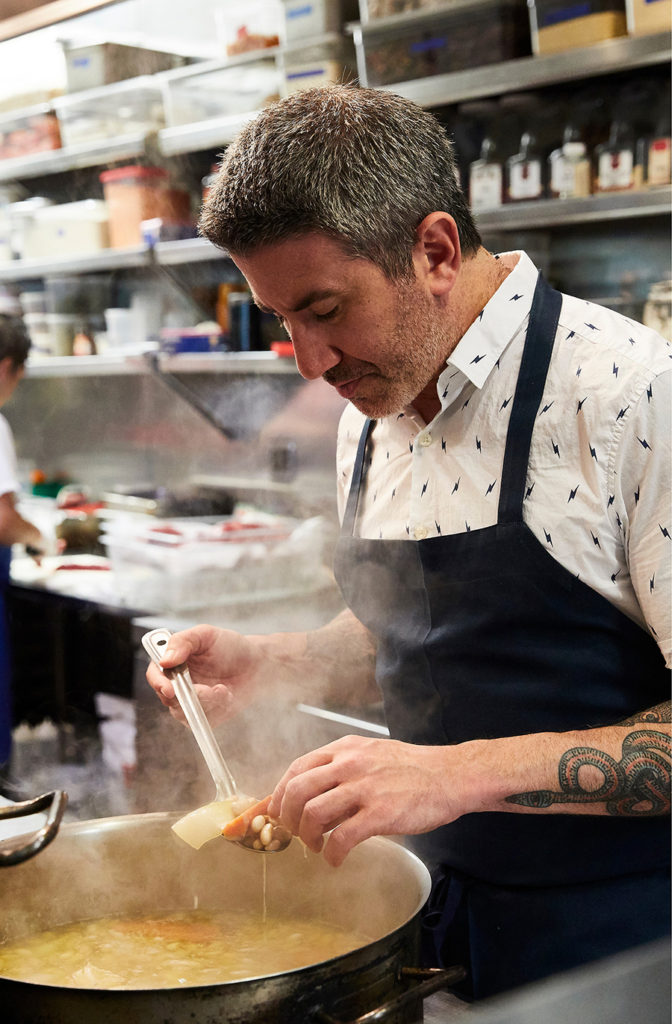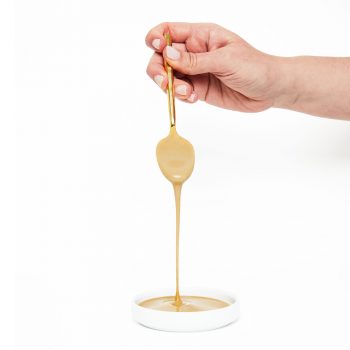Now is time to seed the tahini moment.
Amy Zitelman and her two sisters, Shelby, and Jackie are co-owners of Philadelphia-based Soom Foods, AKA the “Soom Sisters.” They all knew what tahini was growing up eating hummus in Philadelphia. But who would have guessed it would become the seed of opportunity for their livelihood?
My first experience with tahini was in the early ’70s, at a hippy restaurant co-op in a basement along Locust Walk at UPenn when I was in college. We would enjoy brown rice and veggies or big fat salads with a tangy lemon tahini dressing. I can’t still taste the sweet, nutty flavor of that dressing. It was like ambrosia and unlike anything I had tasted growing up in northern New Jersey.
I may have had an earlier experience with Halva, a confection made from sesame paste (tahini) and sugar and nuts when visiting Israel around 1970. But I don’t think I liked it, and I remember it tasting kind of odd and dry.
Soom is Sesame

Soom is Hebrew for sesame seed. When Shelby visited her sister Jackie and her future husband in Israel, they got to sample a fantastic carrot cake made by Jackie’s future mother-in-law. Moist and flavorful, she wanted to know the secret. In Israel, tahini is ubiquitous. Tahini is revered for its flavor and versatility. But in the U.S., tahini was barely known.
Upon returning to the U.S., Shelby and Jackie called upon youngest sister, Amy, to search grocery stores to find tahini only to see that it either didn’t exist or was tucked on a bottom shelf in the international foods sections, gathering dust.
The Seed of Opportunity
The sisters wondered, “why not start a tahini company so we could reproduce that carrot cake?” But they saw the significant potential beyond the special carrot cake.
You can use single source tahini for baking, as a condiment, and as a fat for cooking. The absence of premium quality tahini in the U.S. marketed identified a gap.
In 2013, Soom Foods, a certified women-owned company, was born in Philadelphia. But as you may have guessed, sesame seeds, the essence of tahini, aren’t grown along the Schuylkill River or the steps of the art museum where Rocky did his climb.
For that, you must travel to northern Ethiopia to find the best sesame seeds. And that’s what the Soom Sisters did.
They visited Ethiopia’s northern region to buy ten thousand pounds of high-quality seeds that they shipped to Israel for processing. They didn’t get any credit terms and had to pay upfront, but they were confident that they were moving in the right direction. Given the growth of plant-based food in America and the absence of high-quality tahini, they could almost taste the opportunity.
The Prized Humera Seed

Of the dozens of sesame varieties, it’s the buttery, complex flavor of Humera seeds that produce the best tahini, prized throughout the Middle East and beyond. And those sesame seeds start in the rich soils of Humera, a town dotted with mud huts in the Tigray region of Ethiopia, near the Eritrean and Sudanese borders.
Sesame seeds are a good source of healthy fats, protein, B vitamins, minerals, fiber, antioxidants, and other beneficial plant compounds. Regularly eating substantial portions of these seeds — not just an occasional sprinkling on a burger bun — may aid blood sugar control, combat arthritis pain, and lower cholesterol.
In an article in Saveur Magazine, Jackie said that,
“I had only known tahini as this ambiguous beige sauce or an ingredient you add to hummus,”
Jackie’s husband had worked for a small Israeli tahini distributor who had access and connections in the sesame trade. They began importing these prized Ethiopian seeds for the Soom brand. The seeds came into Israel and were processed and packaged for resale in America. Their product didn’t have the dark brown bitterness often found in the U.S. or the separation.
Ethiopian Humera sesame seeds are to tahini like Nebbiolo grapes are to the great Italian Barolos wines.
Shalom Michael
In Philadelphia, the sisters reached out to Michael Solomonov, an Israeli chef and restaurateur known for his Philadelphia restaurant, Zahav. He won the James Beard Foundation awards for Best Chef: Mid-Atlantic in 2011, Cookbook of the Year in 2016, and Outstanding Chef in 2017.

When Amy asked Michael what tahini brand he was using, he said, “whatever the distributor brings us.”
He bought what was available, but after tasting Soom, he quickly became a Soom fan. Michael included Soom in his cookbook and, as Amy said, Mike is a mensch. He helped bring credibility to our brand.
Also, Chef Shaya from New Orleans became an advocate too. Alon Shaya is an Israeli American celebrity chef and restaurant owner. He is the author of several cookbooks and hospitality and restaurant consulting business, Pomegranate Hospitality, based in New Orleans.
Bloggers and influencers started to write about Soom, and sisters began to reach customers across the country through e-commerce channels. Soomfoods has many intriguing recipes on its website incorporating tahini in unexpected places.
My Soom Call with Amy
On a zoom/soom call with Amy, she shared stories about the trials and tribulations of growing a brand. Their business was expanding in the foodservice and restaurants before Covid – and then, as it was slowing down, their direct-to-consumer business took off and picked up the slack.
Consumers can conveniently buy their products through Amazon. They found strong interest in their high-quality brand and the smooth and pourable tahini product they created. Searches via Google for tahini tripled in 2020, a sign that gave them even more confidence in their business.
Process and packaged in Israel, the Soom Sisters have been focusing on growing in the U.S. by bringing a premium product to consumers craving new flavors and healthy alternatives.
Today Soom sells chocolate tahini and explores some other new line extensions based on tahini into the nut butter category. New flavors are coming in 2021, both online and into retail markets. D.C.- N.Y. distribution.
Lessons from the Soom Sisters

- Follow your curiosity. The sisters loved a hard to detect taste in an Israeli carrot cake, which led to further exploration and research. They didn’t stop when they discovered the secret sauce; they decided to investigate a market opportunity in the U.S.
- Riches in the niches. If you think that tahini is a niche – you are right. But with tools that exist today, you can find more than enough consumers who are passionate about the taste and flavor of their high-quality tahini paste. People want to buy from experts who have in-depth knowledge in a category.
- Focus on sales & marketing. The sisters also recognized that if they could find ways to manage quality control at their contract packers, they could be freed up to focus on sales and marketing. Being focused has proven to be a successful approach for the Soom Sisters. As they expand, they have become experts in finding innovative places for tahini.
I’m excited to follow this company and to watch them seed the moment.

You can set up a time to chat with me about your marketing challenges using my calendar. Email me jeffslater@themarketingsage.com Call me. 919 720 0995. The conversation is free, and we can explore if working together makes sense.
Photos courtesy of Soomfoods and Zahav Restaurant
Note: I write about food and beverage companies but these are not paid or sponsored. They help illustrate stories of foodpreneurs in the wild making wonderful and imaginative products.




